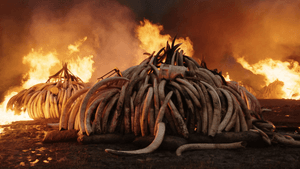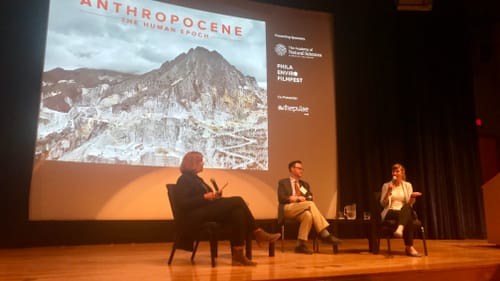Stay in the Loop
BSR publishes on a weekly schedule, with an email newsletter every Wednesday and Thursday morning. There’s no paywall, and subscribing is always free.
A whole new era
The Academy of Natural Sciences presents ‘Anthropocene: The Human Epoch’

As world leaders faced teenage activist Greta Thunberg in New York last week, concerned Philadelphians packed into the sold-out 350-seat auditorium at the Academy of Natural Sciences. They also came in the name of climate change, for a screening of the new documentary Anthropocene: The Human Epoch.
Meet the Anthropocene
The film premiered in the US in more than 110 movie theaters nationwide, coinciding with the United Nations Climate Action Summit. This Canadian film directed by Jennifer Baichwal, featured in the 2019 Sundance Film Festival, asks whether the current period in the Geological Time Scale should be redefined, since human intervention has drastically changed Earth’s atmospheric, geologic, biospheric, and hydraulic environments.
The Geological Time Scale is a calendar of events in the history of the earth throughout its 4.5 billion years, arranged by evidence found in rock strata. We’re living in the Holocene epoch. But many scientists now refer to our current epoch as the Anthropocene, since human intervention has drastically changed the state of the planet. Since “Anthropocene” isn’t an official term as inducted by the International Union of Geological Sciences, the entity responsible for defining Earth’s time scale, the start date of this modern epoch is debated. But many scientists agree that it coincides with the Industrial Revolution.
The bind we’re in
The film takes viewers on a journey around the entire world—a GM plant in Michigan, a lithium farm in the middle of the Atacama Desert in Chile, a logging site in the forest of British Colombia, a 105-ton ivory bonfire blaze in Kenya, an excavation site that destroyed three German towns, a mine in Russia, and more.
The film is lightly narrated and invites viewers to do their own interpreting, with aerial shots of significantly altered landscapes, an interview with a Chilean lithium farmer who—notwithstanding the country’s embroiled conflict over the practice—expresses pride in producing products that help the environment, and Russian mine workers who discuss the fact that they’re being filmed and yuk about how they love their jobs.
“I think the film does a really provocative job at showing the bind we’re in as a society,” Dr. Scott Knowles, Drexel's Department of History head, said in a panel discussion following the screening.
Out of sight for a reason
Although he credits consumers for knowing their phones’ parts come from somewhere, Knowles said the impact of seeing the origin of lithium batteries can serve as a wakeup call.
“I think we have to implicate ourselves,” he said, noting during the panel discussion that he was using his phone to light a piece of paper as he scribbled notes. “[The filmmakers] want to pull back the curtain and say that those things exist out of your sight for a reason.”
"Climate change is one of the many markers of humanity shaping the planet these past 10,000 years," Knowles added. "Plastics, radiation, phosphorus, carbon [and more are] just one part of the story."
Global and local
While many may be unaware of climate-changing happenings around the world, they aren’t oblivious to what’s happening in their own backyard.
“[Climate change] is a global phenomenon,” Dr. Knowles said. “But it’s only experienced locally."
According to a September Inquirer article, folks need only fly into Philadelphia for an example. The city-owned airport is actively making plans to elevate the land to cope with rising water levels.
That’s only the beginning. There’s also heat islands, drastic changes in winter and summer weather phenomena, invasive species like the spotted lanternfly threatening crops and ecosystems, increased rainfall, and more.

“Our food systems are certainly at risk,” said Dr. Stefanie Kroll, and Academy watershed ecologist, during the panel discussion.
Both Kroll and Knowles cited Philadelphia’s waterways as a major source of concern in the climate change progression.
“Flooding and rainfall and sea-level rise [may] disturb some of the monsters in our midst,” Knowles said. “We live in an immensely transformed environment, but we’ve naturalized it.”
Knowles cited Philadelphia’s industrialized past and present, as well as aging infrastructure ill-equipped to handle large amounts of water. The region saw record rainfall levels in 2018, the Inquirer reported last December. That rainfall could, Knowles said, stir up whatever consequences of industrialization may be beneath the soil.
What can Philly do?
The facts presented by the panelists and the film are grim.
“I do think that Earth would be better off without us at this point,” said Kroll, eliciting muffled laughs. But she said that people should remain positive.
“Being a pessimist about it doesn’t help,” she said. “But if we do things, it gives us meaning, it gives us hope.” Panelists’ many suggestions included joining the work of local conservation groups, reducing the number of new smartphones you buy, avoiding bottled water, carrying reusable bags, pressuring local politicians and journalists to be environmental advocates, and continuing to educate yourself.
Storytelling as activism
But the most important thing, Knowles said, is storytelling.
Instead of—or possibly in addition to—outsiders telling the stories of local climate change effects, he said that empowering local communities to tell their own stories, especially if they don’t have the resources to boost those stories themselves, “is a form of activism.”
Here in Philadelphia, folks have resources like museums and an organized local sphere of community organizations.
Knowles encouraged people to engage with policymakers and demand the facts so that they can protect their investments and communities. He pointed to the city’s Office of Sustainability. However, he believes that a shift is up to the individual—through knowledge, pressuring policymakers, and creating new and sustainable habits. Climate change “demands an evolution in our ethics.”
The new BSR reader survey is live, and we want to hear from you! Complete this quick questionnaire, and we’ll enter you in a drawing for a gift certificate good for two Mural Arts Philadelphia tour tickets.
What, When, Where
Anthropocene: The Human Epoch. In a September 25, 2019 screening and panel discussion at the Academy of Natural Sciences of Drexel University, 1900 Benjamin Franklin Parkway, Philadelphia. theanthropocene.org/film.
The Academy of Natural Sciences is a wheelchair-accessible venue. Guests avoiding the stairs should enter at the doors on 19th Street.
Sign up for our newsletter
All of the week's new articles, all in one place. Sign up for the free weekly BSR newsletters, and don't miss a conversation.

 Lane Blackmer
Lane Blackmer